第72章 LETTER XIII(7)
I thoroughly liked his house. It is both fitting and tasteful. We stepped from the ladder into a long corridor, well-matted, which led to a doorway with a gold-embroidered silk or valance, and a looped-up portiere of white-flowered silk or crepe. This was the entrance to a small room very well proportioned, with two similar doorways, curtained with flowered silk, one leading to a room which we did not see, and the other to a bamboo gridiron platform, which in the better class of Malay houses always leads to a smaller house at the back, where cooking and other domestic operations are carried on, and which seems given up to the women. There was a rich, dim light in the room, which was cool and wainscoted entirely with dark red wood, and there was only one long, low window, with turned bars of the same wood. There were three handsome cabinets with hangings of gold and crimson embroidery, and an ebony frame containing a verse of the Koran in Arabic characters hung over one doorway. In accordance with Mohammedan prohibitions, there was no decoration which bore the likeness of any created thing, but there were some artistic arabesques under the roof. The furniture, besides the cabinets, consisted of a divan, several ebony chairs, a round table covered with a cool yellow cloth, and a table against the wall draped with crimson silk flowered with gold. The floor was covered with fine matting, over which were Oudh rugs in those mixtures of toned-down rich colors which are so very beautiful. Richness and harmony characterized the room, and it was distinctively Malay; one could not say that it reminded one of anything except of the flecked and colored light which streams through dark, old, stained glass.
The Datu Bandar's brother and uncle came in, the first a very handsome Hadji, with a bright, intelligent countenance. He has lived in Mecca for eight years studying the Koran under a renowned teacher, and in this quest of Mussulman learning has spent several thousand dollars.
"We never go to Mecca to trade," he said; "we go for religious purposes only." These men looked superb in their red dresses and turbans, although the Malays are anything but a handsome race. Their hospitality was very graceful. Many of the wealthier Mohammedans, though they don't drink wine, keep it for their Christian guests, and they offered us champagne, which is supposed to be an irresistible temptation to the Christian palate. On our refusing it they brought us cow's milk and most delicious coffee with a very fragrant aroma, and not darker in color than tea of an average strength. This was made from roasted coffee leaves. The berries are exported. A good many pretty, quiet children stood about, but though the Rajah gave us to understand that they were the offspring of three mothers, we were not supposed to see any of "the mean ones within the gates."
Our hosts had a good deal to say, and did not leave us to entertain them, though we are but "infidel dogs." That we are regarded as such, along with all other unbelievers, always makes me feel shy with Mohammedans. Some time ago, when Captain Shaw pressed on the Malays the impropriety of shooting Chinamen, as they were then in the habit of doing, the reply of one of them was, "Why not shoot Chinamen? they've no religion;" and though it would be highly discourteous in members of a ruled race to utter this sentiment regarding their rulers, I have not the least doubt that it is their profound conviction concerning ourselves.
Nothing shows more the honesty and excellence of Captain Murray's purposes than that he should be as much respected and loved as he is in spite of a manner utterly opposed to all Oriental notions of dignity, whether Malay or Chinese. I have mentioned his abruptness, as well as his sailor-like heartiness, but they never came into such strong relief as at the Datu Bandar's, against the solemn and dignified courtesy of our hosts.
We returned after dark, had turtle-soup and turtle-steak, not near so good as veal, which it much resembles, for dinner; sang "Auld Lang Syne," which brought tears into the Resident's kindly eyes, and are now ready for an early start to-morrow.
Stadthaus, Malacca.--We left Serambang before daylight on Thursday in buggies, escorted by Captain Murray, the buggies, as usual, being lent by the Chinese "Capitans." Horses had been sent on before, and after changing them we drove the second stage through most magnificent forest, until they could no longer drag the buggies through the mud, at which point of discomfiture three saddled ponies and two chairs were waiting to take us through the jungle to the river. We rode along an infamous track, much of it knee-deep in mud, through a green and silent twilight, till we emerged upon something like English park and fox-cover scenery, varied by Malay kampongs under groves of palms. In the full blaze of noon we reached the Linggi police station, from which we had started in the sampan, and were received by a company of police with fixed bayonets. We dined in the police station veranda, and as the launch had been obliged to drop down the river because the water was falling, we went to Sempang in a native boat, paddled by four Malays with paddles like oval-ended spades with spade handles, a guard of honor of policemen going down with us. There we took leave of our most kind and worthy host, who, with tears in his kind eyes, immediately turned up the river to dwell alone in his bungalow with his bull-dog, his revolver, and his rifle, a self-exiled man.*